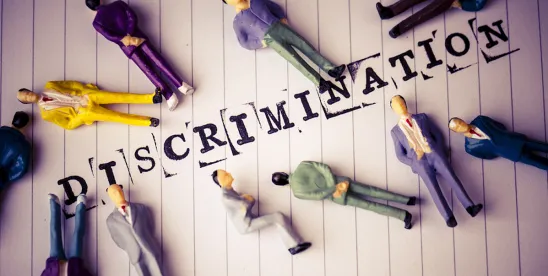On July 29, 2025, the Department of Justice (“DOJ”) issued guidance outlining what it considers “unlawful discrimination” by recipients of federal funds. In the guidance, Attorney General Bondi clarifies the application of federal antidiscrimination laws to programs or initiatives that may involve discriminatory practices, including those labeled as Diversity, Equity, and Inclusion (“DEI”) programs. Entities that receive federal funds—including educational institutions, state and local governments, and public and private employers—must ensure that their programs and activities comply with federal law and do not discriminate based on protected characteristics, such as race, color, national origin, sex, religion—no matter the program’s “labels, objectives, or intentions.” Per the guidance, knowingly funding contractors, grantees, or other third parties who engage in discriminatory policies and practices could result in revocation of federal funds. The below summarizes DOJ’s guidance within the memo as well as collateral False Claims Act risks associated with engaging in unlawful discrimination.
DOJ’s Seven Key Takeaways Regarding Legal Risks and Non-Binding Best Practices
DOJ’s guidance includes seven key takeaways regarding the legal risks of initiatives involving discrimination based on protected characteristics, and provides non-binding best practices to help entities avoid the risk of violation:
- Federal law prohibits discrimination based on protected characteristics.
- The use of terms such as “DEI” or “equity” does not excuse or absolve parties from scrutiny.
- Using protected characteristics for employment, program participation, resource allocation, or other similar activities, opportunities, or benefits is unlawful, except in rare cases that withstand judicial scrutiny.
- Requiring employees to share intimate spaces with the opposite sex or allowing men to compete in athletic competitions for a women’s athletic competition “would be typically unlawful.”
- Facially neutral criteria (e.g., “cultural competence,” “lived experience,” “geographic targeting”) that function as proxies for protected characteristics violates federal law if “designed or applied with the intention of advantaging or disadvantaging individuals based on protected characteristics.”
- Recipients of federal funds should ensure that federal funds do not support third-party programs that discriminate based on protected characteristics.
- Individuals who object to, or refuse to participate, in programs, trainings, or policies that involve discrimination based on protected characteristics “are protected from adverse actions” such as termination or exclusion based on the individual’s objections to such practices.
DOJ’s Non-Exhaustive List of Unlawful Practices That Could Result in Federal Fund Revocation
In its guidance, DOJ provided a “non-exhaustive” list of unlawful practices that could result in the revocation of federal funds and provided examples in five categories: (1) granting preferential treatment based on protected characteristics, (2) prohibited use of proxies for protected characteristics, (3) segregation based on protected characteristics, (4) unlawful use of protected characteristics, and (5) training programs that promote DEI.
Granting Preferential Treatment Based on Protected Characteristics
| Unlawful Preferential Treatment | Examples of Unlawful Practices |
| Providing opportunities, benefits, or advantages based on protected characteristics that results in a disadvantage to other qualified persons. | Race-based scholarships or programs, including internships, mentorship programs, or leadership initiatives, that reserve spots for specific racial groups—regardless of intent to promote diversity.
Hiring or promotion practices that “prioritizes candidates from underrepresented groups” for admission, hiring, promotion, bypassing qualified candidates who do not belong to those groups. Creating a “safe space” or areas exclusively for individuals of a specific racial or ethnic group. |
Prohibited Use of Proxies for Protected Characteristics
| Unlawful Proxies | Examples of Potentially Unlawful Proxies |
| Use of neutral criteria that is intended to function as a substitute for explicit consideration of protected characteristics.
DOJ will consider such criteria as problematic if (a) the criteria are selected because they are used as substitutes for protected characteristics or (b) the criteria are implemented with the intent to advantage or disadvantage individuals based on protected characteristics. |
Asking a job applicant to “demonstrate cultural competence,” “lived experience,” or “cross-cultural skills” as a way to evaluate the applicant’s racial or ethnic background.
Implementing recruitment strategies targeting specific geographic areas, institutions, or organizations that are primarily chosen for their racial or ethnic composition. Requiring applicants of a federally funded program to describe “obstacles they have overcome” or to submit a “diversity statement” with the intent to identify persons with protected characteristics. |
Segregation Based on Protected Characteristics
| Unlawful Segregation | Examples of Unlawful Practices |
| Organizing programs, activities, trainings, or resources that separate or restrict access based on protected characteristics, including failing to maintain sex-separated athletic competitions and “intimate spaces.”
DOJ considers these to create unequal treatment or reinforce stereotypes but recognizes the narrow exception where federal law expressly permits race-based remedies for specific, documented acts of past discrimination by the entity, or sex-based requirements. |
Hosting a training program that requires participants to separate into race-based groups and prohibiting individuals of other races from participating.
Designating certain areas for individuals of a certain race and discouraging access by students of other races. Hosting DEI-focused trainings that requires participants to identify with a specific protected characteristic and effectively excluding others who meet objective program criteria. |
Unlawful Use of Protected Characteristics
| Unlawful Use of Protected Characteristics | Examples of Unlawful Practices |
| Consideration of a protected characteristic as a basis for selecting applicants for employment, contract awards, or program participation.
This includes policies explicitly mandating representation of specific groups in candidate pools or prioritizes protected characteristics (such as “diverse slate” requirements, diversity decision-making panels, or diversity-focused evaluations). |
Adopting a policy requiring that all interview slates for a certain position include a minimum number of candidates from specific racial groups and rejecting otherwise qualified candidates who do not meet this racial criterion.
Implementing a policy that prioritizes the award of contracts to women-owned business over other more qualified businesses. Requiring 50% of selected participants of a federally funded internship to be from “under-represented racial groups.” |
Training Programs that Promote Discrimination or Hostile Environments
| Unlawful DEI Training Programs | Examples of Unlawful Practices |
| DEI training programs which through their content, structure, or implementation are intended to result in the exclusion or disadvantage to other individuals based on protected characteristics and create a hostile work environment. | Trainings which exclude or penalize individuals based on protected characteristics or create a hostile work environment through severe or pervasive use of training materials that single out individuals based on their protected characteristics.
For example, requiring teachers to complete a DEI training that includes statements that stereotype individuals based on protected characteristics. |
DOJ’s Nine Recommendations on Best Practices
DOJ also provides the following recommendations on best practices for federally funded entities and programs to avoid legal risk:
- Ensure inclusive access to workplace programs, activities, trainings, and resources to all qualified individuals regardless of protected characteristics.
- Base selection of candidates on specific, measurable skills and qualifications directly related to job performance or program participation.
- Prohibit demographic-driven criteria and discontinue any program or policy designed to achieve discriminatory outcomes—even those using facially neutral means.
- Document legitimate rationales and ensure that all decisions related to hiring, promotions, or selection of contracts are based on legitimate, non-discriminatory objectives and ensure consistent application of such objectives.
- Scrutinize neutral criteria for proxy effects to ensure such criteria does not result in preferential treatment based on protected characteristics.
- Eliminate diversity quotas.
- Avoid exclusionary training programs and ensure trainings are open to all qualified participants, regardless of protected characteristics.
- Include non-discrimination clauses in contracts and monitor compliance with such clauses.
- Establish clear anti-retaliation procedures and safe-reporting mechanisms that allow individuals to raise concerns, file complaints, or refuse to participate in potentially discriminatory programs.
In summary, DOJ’s guidance provides a comprehensive framework of potential footfalls for entities or programs that receive federal funding directly or indirectly. In addition to potential liability for violating anti-discrimination laws, entities may also run afoul of the False Claims Act (FCA) if they falsely certify compliance with anti-discrimination laws while knowingly (or with reckless disregard or deliberate ignorance) engaging in programs or adopting policies that assign benefits or burdens based on protected characteristics. False certification can occur when a party makes a claim knowing it does not meet a statutory, regulatory, or contractual requirement and still submits a claim for payment to the government while failing to disclose its non-compliance. However, FCA liability also hinges on showing that the false certification was material to the government’s payment. Entities receiving federal funding should review their policies and procedures to ensure compliance with federal non-discrimination law, as anti-DEI enforcement is a top FCA enforcement priority for DOJ.






 />i
/>i
